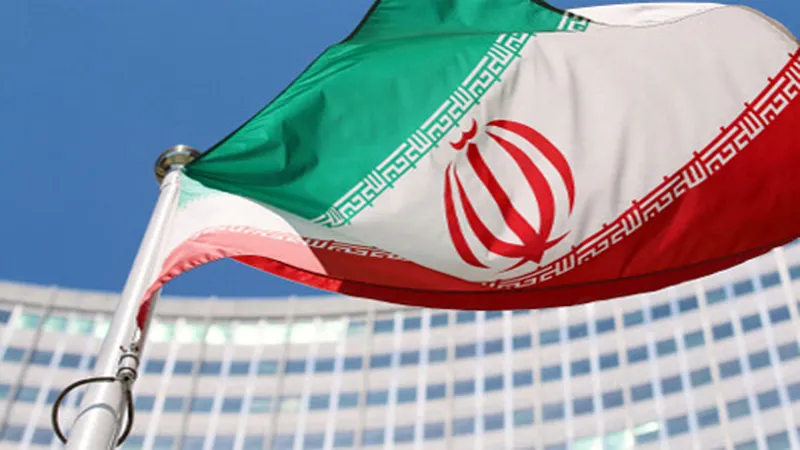-
CENTRES
Progammes & Centres
Location
Senator John Kerry has been at pains to convince his Iranian counterpart that the Congressional act of voting on April 14 to appropriate to itself the power to reject the final deal is merely symbolic and President Obama can easily over-ride these hurdles. But what it reveals is an ugly side of the Congressmen who still live in a world of 'sanctioning' the rest.

The Framework Agreement between Iran and the P5+1 on its nuclear programme, that was agreed on 2nd April, now stands hostage not so much to the hardliners in Tehran but more to the vagaries of the US Congress, whose acts in the last few weeks have gone from the utterly bizarre to the apparently unconstitutional. The bizarre act was the Open Letter written by 47 Senators, on 9th March, to the Supreme Leader of Iran stating that they could/would overturn any agreement their President would endorse in a matter of less than two years. Now comes the unconstitutional grab of Executive authority. Here it must be clarified that there are three kinds of international accords according to the US law - 'treaties' (approved by 2/3rds of the Senate), 'congressional -executive agreements' (approved by a simple majority) and 'sole-executive agreements' approved by the President alone.
What the US Congress voted on 14th April was to appropriate to itself the power to reject the final deal that would be reached with Iran on 30th June, which is entirely within the purview of an 'Executive agreement'. The Congressmen brazenly ignored the fact that the deal is not a bilateral deal between the US and Iran, but a multilateral deal between Iran and P5+1 and that the US is only one among the six countries that have been mandated to negotiate by the UNSC. Even if the US Congress rejects the deal, the UK, France, Russia, China, Germany and the UN itself are not bound by its disapproval. Well, they may arm-twist the UK, France and even Germany to fall in line to impose further sanctions, but neither Russia nor China are likely to play ball with the US Congress, particularly now that Russia itself has been subjected to American sanctions over the Ukraine issue.
Why does the US Congress get into such paroxysms of nervousness over Iran's nuclear deal? Clearly an Iranian bomb, that has now been pushed into a 'break away period' of 10 years, poses no danger whatsoever to the US, nor does it really pose any serious threat to Israel that is already in possession of at least 100 atomic bombs. Nor is it that they have something against an 'Islamic Bomb', for they have all reconciled to the Pakistani bomb. Then where is the bug? Are the AIPAC and Premier Netanyahu so paranoid that they would not allow any kind of a deal between Presidents Obama and Rouhani? If you thought the Jewish lobby is the most powerful lobby in Washington, then you haven't heard of the Saudi lobby. That is the only lobby that scares the Jewish lobby. Now imagine an outcome that is loathed by both the lobbies.When these two lobbies get together, the most powerful man on earth feels truly humbled. That perhaps is the reason why President Obama had to defer space to the US Congress into what is constitutionally his sole prerogative - the power of the Executive to conclude agreements with foreign countries without ratification by the US Congress.
To put things in the right perspective, the US Congressmen need to be reminded that in the present Agreement, it is the Republic of Iran that has given away much more than any of the other negotiating powers. A negotiation that lasted for almost 18 months, since November 2013, has resulted in such a skewed pact for Iran that after agreeing to reduce its stockpile of low enriched uranium to 300kgs from the earlier stock of over 12000kgs, it is still not certain as to whether the sanctions would all be lifted in one go after 30th June or will they be lifted in a phased manner lasting several years.
Besides, Iran had already stopped its high enrichment of Uranuim (up to 20%) and stopped adding any more centrifuges in its nuclear reactors in Natanz and in Fordow, the real smoking gun. It had also agreed to the Additional Protocol of the IAEA that permitted intrusive and short notice inspection by its inspectors. And further blocking the plutonium path for its weaponisation, Iran had agreed to change the core design of its reactor in Arak. With all these steps in place, President Obama could declare, quite confidently, that they have blocked all paths of nuclear weaponisation by Iran. Now the 'break away' period has been increased from one year to 'one year + the ten year' fenced-in period. Even then a few sceptics questioned President Obama as to whether Iran could go nuclear 12 years or 13 years hence!
Now what have the US and other five powers given in return to Iran? An acknowledgement that Iran has the right to peaceful use of nuclear energy or that it can enrich uranium up to 5%. A right that is already provided to every signatory of the Nuclear Non-Proliferation Treaty to which Iran is a signatory. No fresh bundle of sanctions has been lifted as was done in November 2014. Last year the US agreed to unblock $8 billion out of over $100 billion of Iranian funds lying in international banks. The expectation is that a huge bonanza waits for Iran at the end of 30th June when the final deal is struck. That date has now been pushed to another 52 days by an intractable Congress.
Senator John Kerry has been at pains to convince his Iranian counterpart that the Congressional act is merely symbolic and President Obama can easily over-ride these hurdles. But what it reveals is an ugly side of the Congressmen who still live in a world of 'sanctioning' the rest, while President Obama has moved on and has fully grasped the utter futility of the sanctions regime. His decision, last week, to shake hands with Raul Castro and remove Cuba from the list of 'sponsors of terrorism' is only a reaffirmation of that belief that sanctions, even after 50 years, do not change the behaviour of nations nor do they incite a people to overthrow regimes that are undesirable to the White House. His greatest legacy would be not only the 'mainstreaming of Iran and Cuba' but his attempt to change the mindset of a Congressional leadership that is still inherently imperial and autocratic.
(Ravi Joshi is former diplomat & Visiting Distinguished Fellow at Observer Research Foundation)
Courtesy: The Economic Times
The views expressed above belong to the author(s). ORF research and analyses now available on Telegram! Click here to access our curated content — blogs, longforms and interviews.

Anjali Birla is an Indian Civil Services Officer(Batch 2020) working in the Ministry of Railways and has done her graduation in Political Science from Delhi ...
Read More +